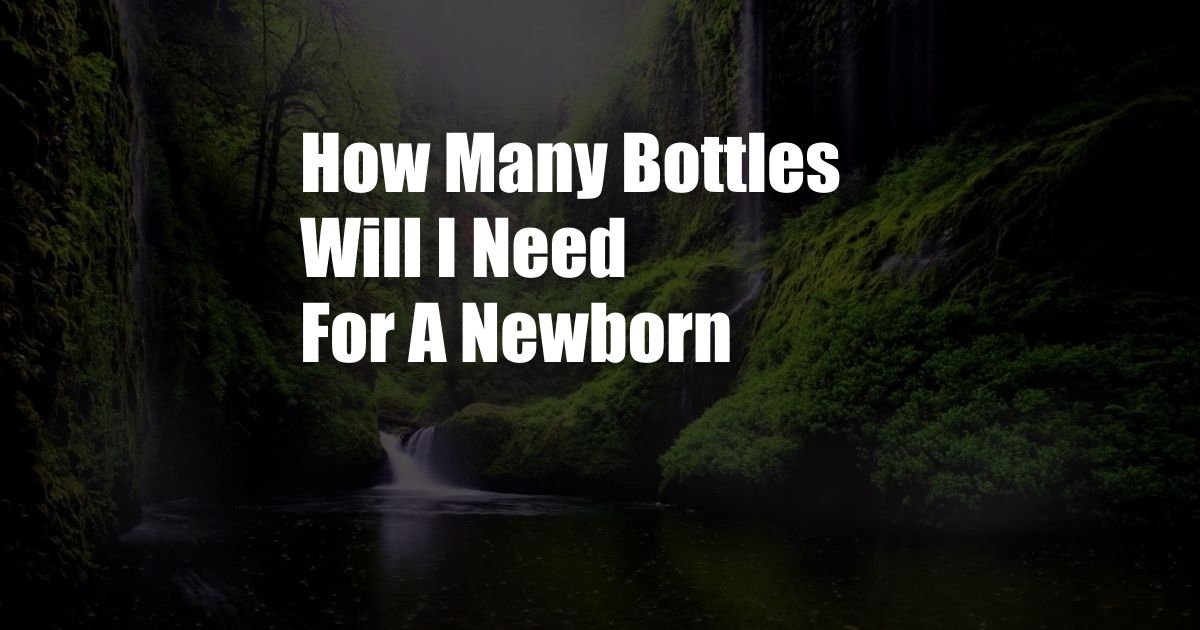
How Many Bottles Will I Need for a Newborn? A Comprehensive Guide
As expectant parents eagerly prepare for the arrival of their little one, one of the many questions they may have is regarding the number of bottles they will need. Navigating this decision is crucial to ensure you have sufficient bottles on hand without overstocking. In this comprehensive guide, we will delve into the factors influencing the number of bottles required and provide expert insights to help you make an informed decision.
Understanding your baby’s feeding habits is essential in determining the number of bottles you will need. Every newborn has different feeding patterns and preferences, so it’s important to observe your baby’s needs during the first few weeks to get a better sense of how often and how much they feed. Some babies may prefer to feed every 2-3 hours, while others may go 4-5 hours between feedings. The amount of milk they consume at each feeding will also vary.
Choosing the Right Bottles
Once you have a better understanding of your baby’s feeding habits, you can start to choose the right bottles. Consider the following factors when selecting bottles:
- Material: Choose bottles made from BPA-free plastic, glass, or silicone. Glass bottles are considered more hygienic but can be heavier and more prone to breakage.
- Nipple Type: There are various nipple shapes and sizes available. Experiment with different nipples to find one that your baby prefers and promotes proper latching.
- Size: Bottles come in different sizes, typically ranging from 2 to 8 ounces. Start with smaller bottles and increase the size as your baby’s appetite grows.
How Many Bottles to Buy
The number of bottles you need will depend on several factors, including:
- Frequency of feedings: If your baby feeds every 2-3 hours, you will need more bottles than if they feed every 4-5 hours.
- Amount of milk consumed: If your baby consumes a lot of milk at each feeding, you will need more bottles.
- Washing frequency: If you hand-wash bottles, you will need more bottles than if you use a dishwasher.
As a general rule of thumb, most experts recommend having 6-8 bottles on hand. This will give you a sufficient supply to rotate through while ensuring you have enough clean bottles available at all times. If you are concerned about running out of bottles, you can always purchase more as needed.
Tips and Expert Advice
- Sterilize bottles before first use: This will help prevent the spread of bacteria.
- Wash bottles thoroughly after each use: Use hot, soapy water and a bottle brush.
- Inspect bottles regularly: Check for any cracks or damage that could pose a hazard.
- Replace bottles when necessary: Bottles that are scratched or damaged should be discarded to ensure safety.
- Use a bottle warmer: This can help make feedings more comfortable for your baby, especially at night.
Frequently Asked Questions (FAQs)
Q: What size bottles should I buy for a newborn?
A: Start with 2-4 ounce bottles and gradually increase the size as your baby’s appetite grows.
Q: How often should I wash bottles?
A: Wash bottles thoroughly after each use with hot, soapy water and a bottle brush.
Q: Can I reuse bottles?
A: Yes, bottles can be reused as long as they are properly sterilized and inspected for damage.
Q: How long do bottles last?
A: Bottles typically last for 3-4 months, depending on how often they are used and washed.
Q: Do I need to have different bottles for different types of milk?
A: It’s not necessary to have separate bottles for different types of milk, but you may prefer to have different nipples for different types of milk (e.g., a slower flow for breastmilk and a faster flow for formula).
Conclusion
Determining the number of bottles you need for a newborn involves observing your baby’s feeding patterns and preferences. By considering the factors discussed in this guide, you can make an informed decision that ensures you have sufficient bottles without overstocking. Remember to follow the tips and expert advice provided to ensure the safety and hygiene of your baby’s feeding experience.
Are there any other aspects of using bottles for newborns that you would like to know more about? Share your questions or comments below, and let’s continue the conversation.